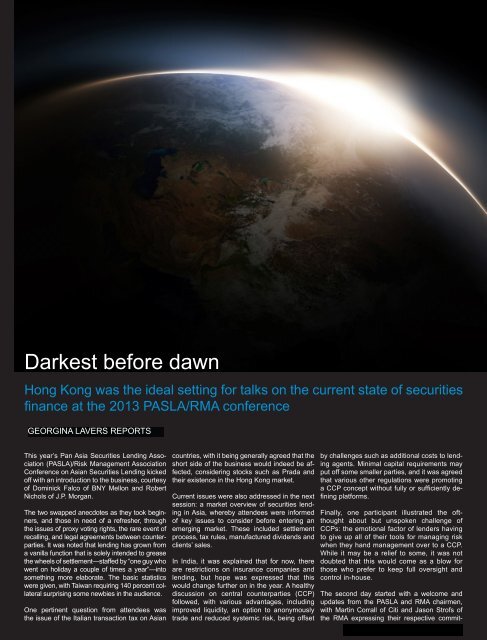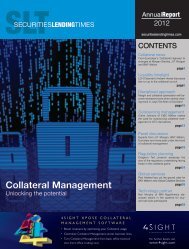read - Securities Lending Times
read - Securities Lending Times
read - Securities Lending Times
Create successful ePaper yourself
Turn your PDF publications into a flip-book with our unique Google optimized e-Paper software.
Darkest before dawn<br />
Hong Kong was the ideal setting for talks on the current state of securities<br />
finance at the 2013 PASLA/RMA conference<br />
GEORGINA LAVERS REPORTS<br />
This year’s Pan Asia <strong>Securities</strong> <strong>Lending</strong> Association<br />
(PASLA)/Risk Management Association<br />
Conference on Asian <strong>Securities</strong> <strong>Lending</strong> kicked<br />
off with an introduction to the business, courtesy<br />
of Dominick Falco of BNY Mellon and Robert<br />
Nichols of J.P. Morgan.<br />
The two swapped anecdotes as they took beginners,<br />
and those in need of a refresher, through<br />
the issues of proxy voting rights, the rare event of<br />
recalling, and legal agreements between counterparties.<br />
It was noted that lending has grown from<br />
a vanilla function that is solely intended to grease<br />
the wheels of settlement—staffed by “one guy who<br />
went on holiday a couple of times a year”—into<br />
something more elaborate. The basic statistics<br />
were given, with Taiwan requiring 140 percent collateral<br />
surprising some newbies in the audience.<br />
One pertinent question from attendees was<br />
the issue of the Italian transaction tax on Asian<br />
The second day started with a welcome and<br />
updates from the PASLA and RMA chairmen,<br />
with Martin Corrall of Citi and Jason Strofs of<br />
the RMA expressing their respective commitcountries,<br />
with it being generally agreed that the<br />
short side of the business would indeed be affected,<br />
considering stocks such as Prada and<br />
their existence in the Hong Kong market.<br />
Current issues were also addressed in the next<br />
session: a market overview of securities lending<br />
in Asia, whereby attendees were informed<br />
of key issues to consider before entering an<br />
emerging market. These included settlement<br />
process, tax rules, manufactured dividends and<br />
clients’ sales.<br />
In India, it was explained that for now, there<br />
are restrictions on insurance companies and<br />
lending, but hope was expressed that this<br />
would change further on in the year. A healthy<br />
discussion on central counterparties (CCP)<br />
followed, with various advantages, including<br />
improved liquidity, an option to anonymously<br />
trade and reduced systemic risk, being offset<br />
by challenges such as additional costs to lending<br />
agents. Minimal capital requirements may<br />
put off some smaller parties, and it was agreed<br />
that various other regulations were promoting<br />
a CCP concept without fully or sufficiently defining<br />
platforms.<br />
Finally, one participant illustrated the oftthought<br />
about but unspoken challenge of<br />
CCPs: the emotional factor of lenders having<br />
to give up all of their tools for managing risk<br />
when they hand management over to a CCP.<br />
While it may be a relief to some, it was not<br />
doubted that this would come as a blow for<br />
those who prefer to keep full oversight and<br />
control in-house.












